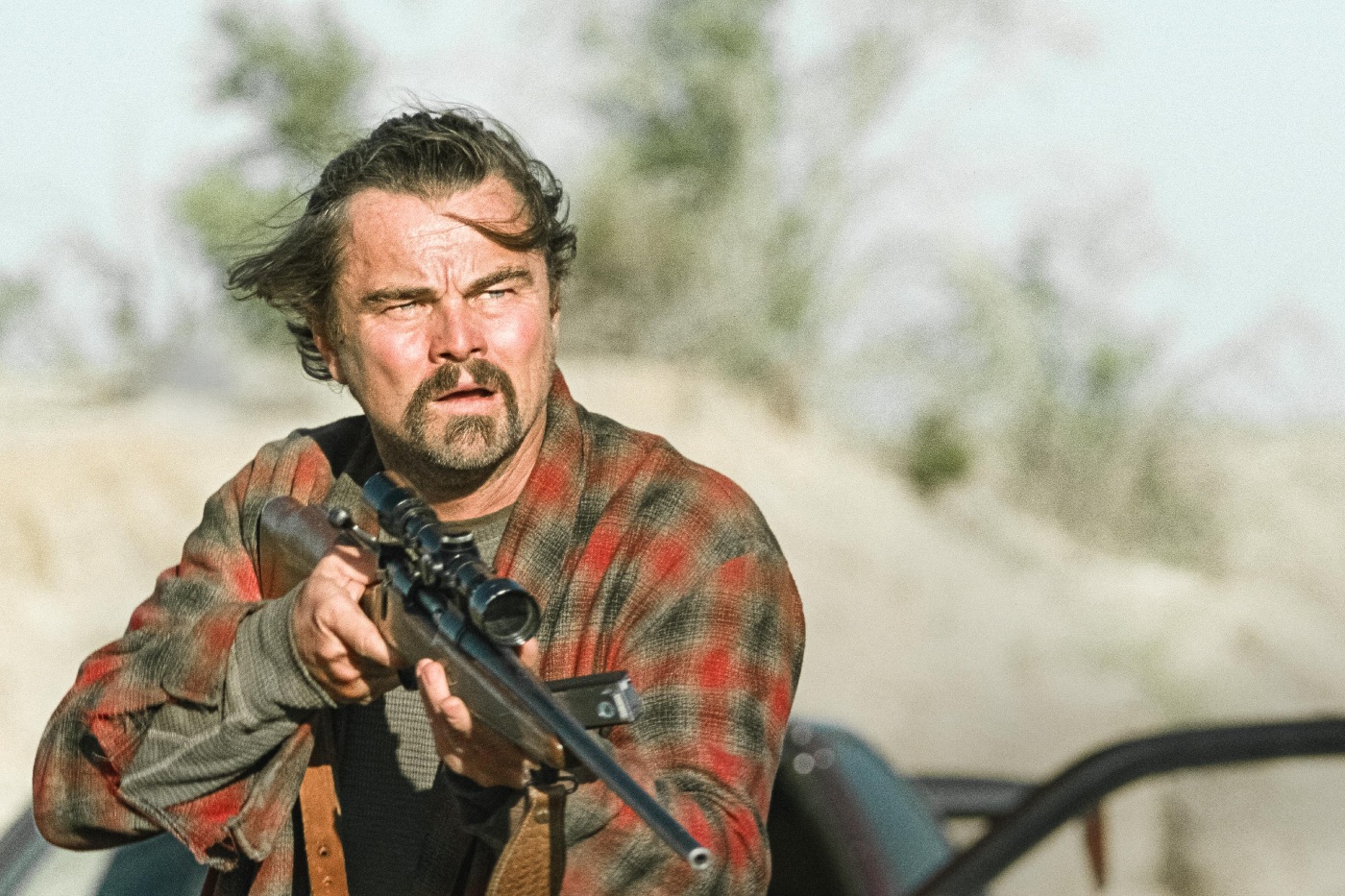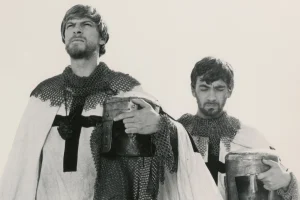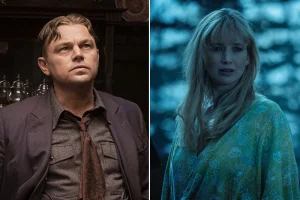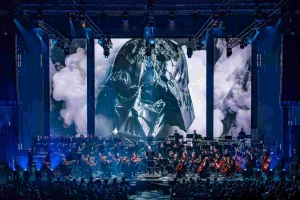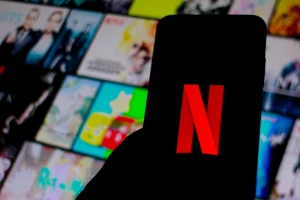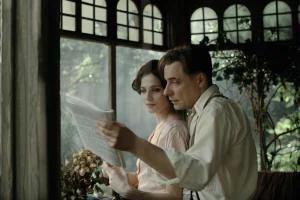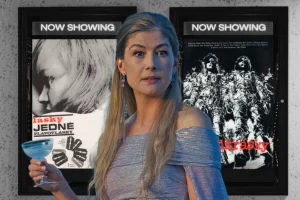A washed-up revolutionary scrambles to save his daughter when an old enemy reappears in One Battle After Another, which opens in Prague and cinemas worldwide this weekend. Paul Thomas Anderson‘s loose interpretation of Thomas Pynchon‘s Vineland (which gets an “inspired by” credit) uses the 1990 novel as a springboard to something that feels both refreshingly original and frighteningly relevant: this invigorating, timely call to action is easily the best major studio release of 2025, and an early favorite for Best Picture at next year’s Academy Awards.
Despite being considered one of Pynchon’s more approachable novels, Vineland—like all of the author’s output—is a sprawling self-referential work too complex and labyrinthine for a traditional adaptation. Anderson did a sublime job in translating Pynchon’s madness to the screen in the underrated Inherent Vice—which will be re-appreciated by future generations as one of the best films of the 2010s—but he takes another direction entirely in One Battle After Another and ends up with something that feels richly satisfying on a completely different level.
The film’s whirlwind intro, essentially a 30-minute montage, delivers the rat-a-tat backstory that sets the events of One Battle After Another into motion. Perfidia Beverly Hills (Teyana Taylor) is the leader of the French 75, a California-based underground resistance group, and wife of Ghetto Pat (Leonardo DiCaprio), a pyrotechnics pro who assists in setting off fireworks during a raid on an ICE-like immigrant detention facility in the film’s opening scene.
During the raid, Perfidia emasculates the head of that facility, Col. Steven J. Lockjaw (Sean Penn)—but he gets off on it, and begins following her not to enact revenge, but to start a clandestine relationship that the empowered Perfidia doesn’t exactly reject. A child is born, but a fateful bank robbery sees Perfidia arrested and turned informant, and her resistance group dispersed and gone into hiding.
Sixteen years later, Lockjaw finds himself applying to the Christmas Adventurers, a high-powered cabal of white supremacists embedded in government and industry, represented by Virgil Throckmorton (Tony Goldwyn), Tim Smith (John Hoogenakker), and Roy More (Kevin Tighe). But their thorough background check just might uncover his past transgressions, which include a potential mixed-race child. So Lockjaw tracks down Pat and his now-teenage daughter—living as Bob and Willa Ferguson (Chase Infiniti)—to the fictional Northern California town of Baktan Cross, where he stages an immigration raid on the entire town as a cover to locate Willa and clean up his past.
This frenetic opening act, which delivers story beats at the rate of a machine gun, is brought together through Andy Jurgensen’s deceptively smooth editing and (especially) Jonny Greenwood’s arresting jazz-tinged original score, which effortlessly ties everything together into a single, approachable vision. For One Battle After Another to properly adapt Pynchon, the rest of the film would need to continue at this pace, and most likely, completely overwhelm the viewer.
Instead, Anderson settles into his own unique groove over the next two hours, which roughly cover the events of a single night. Willa makes contact with resistance contact Deandra (Regina Hall) and Bob hooks up with Willa’s karate instructor Sergio St. Carlos (Benicio Del Toro) to track her down—with Lockjaw and his army on everybody’s tail. Amusingly, Bob has forgotten all the underground codespeak after 16 years of drug and alcohol abuse, leading to complications as he attempts to save his daughter while scrambling around in a flowing robe à la The Dude from The Big Lebowski.
One Battle After Another becomes an almost indescribable experience over the next two hours, packed with prescient social commentary (updated from the milieu of Pynchon’s hippie counterculture-meets-Reaganomics to fit contemporary America), subversive satire, slapstick comedy, tense father-daughter drama, and thrilling scenes of action—including a climactic chase on the undulating hills of Highway 78 in Borrego Springs that is an instant cinematic classic.
A wealth of memorable performances keep us glued to the screen: DiCaprio is an absolute riot, infusing this character with breathless screwball energy, while Penn balances menace with vulnerability, giving his villain unexpected depth. Infiniti shines as Willa, whose determined presence belies her age, recalling Jennifer Lawrence in Winter’s Bone. Taylor is arresting as the sexually charged revolutionary who sets the film’s chain of events into motion, and Del Toro is perfectly-cast as the Sensei who keeps his calm at every turn.
Michael Baumann’s VistaVision cinematography captures rural locations in California and Texas—from Sacramento to El Paso—with striking, sun-soaked visuals, pairing with first-rate production and costume design to give the film a distinct Southwest Americana feel. The brisk editing and ever-flowing original score—with a few choice classics that recall the era of the novel—help propel the narrative forward at all times, keeping the nearly three-hour film electric throughout.
For readers of Pynchon, it feels a little strange to adapt the general plot outline from Vineland while largely ignoring all the asides and idiosyncrasies that make his novels what they are. But Anderson instills his own unique sensibilities here, and every element—from the character names to the cultural references to the offbeat complexities in almost every line of dialogue—feel like a loving nod to the author.
While it may be a tough sell to general audiences—the description of “epic black comedy” is fitting—it’s hard to imagine a better film coming out this year; awards season accolades will undoubtedly reward its creators, including Anderson, who may have just made his best film. One Battle After Another is that rare thing in cinema, something that feels fresh and new and different than anything that has come before it. The experience of watching it is one of pure joy.

